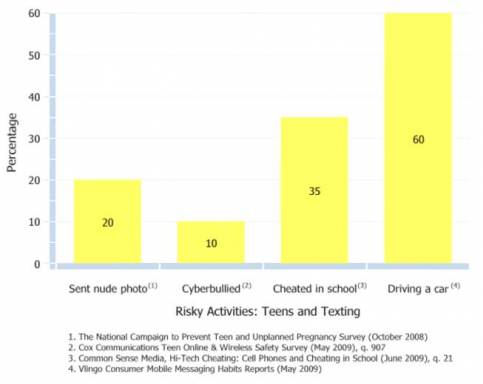 As the word "sexting" began to gradually make its way into every parent’s vocabulary, we worried that racy images of our kids could get passed on to other kids and embarrass our child. But now a new buzzword – sextortion – is proving how dangerous the practice of sexting really can be.
As the word "sexting" began to gradually make its way into every parent’s vocabulary, we worried that racy images of our kids could get passed on to other kids and embarrass our child. But now a new buzzword – sextortion – is proving how dangerous the practice of sexting really can be.
Sextortion is shorthand for online sexual extortion. When someone posts or sends suggestive photos or video of themselves through an online medium, it can be accessed by Internet-savvy strangers.
Sexting Legislation
 Sexting is quickly becoming a rampant problem in high schools and junior highs. One in five teens have sent a nude or semi-nude picture of themselves to someone else’s cell phone, and one in four have seen a nude or semi-nude picture intended for someone else.
Sexting is quickly becoming a rampant problem in high schools and junior highs. One in five teens have sent a nude or semi-nude picture of themselves to someone else’s cell phone, and one in four have seen a nude or semi-nude picture intended for someone else.
In this climate where racy self-portraits of our kids are being circulated around the school or Internet, many parents are up in arms but don’t know what to do. It’s certainly alarming, but is it illegal? Should it be?
Internet Addiction May Put Teens at Risk for Facebook Depression
 Would your teen start to get the shakes after 15 minutes if you took away the computer and all their Bluetooth-enabled devices? If so, it may be time to worry about their online usage’s impact on their mental health.
Would your teen start to get the shakes after 15 minutes if you took away the computer and all their Bluetooth-enabled devices? If so, it may be time to worry about their online usage’s impact on their mental health.
A study published on Monday by the Archives of Pediatric & Adolescent Medicine suggests that teenagers who are pathologic Internet users are twice as likely to develop clinical depression.
The FamilyConnect Platform Announces Support for MySpace
 I’m pleased to announce that MySpace has now been added to our service via the FamilyConnect platform. This new feature enables you to better educate, engage with and protect your child when they use the popular website. Unlike parental control software that is installed on a specific computer, our service runs across the Internet itself. This approach addresses the reality that our children are increasingly social and mobile.
I’m pleased to announce that MySpace has now been added to our service via the FamilyConnect platform. This new feature enables you to better educate, engage with and protect your child when they use the popular website. Unlike parental control software that is installed on a specific computer, our service runs across the Internet itself. This approach addresses the reality that our children are increasingly social and mobile.
- Who is “friending” your child on MySpace ?
- Who is talking to your child the most on MySpace?
New Facebook Safety Page
 Facebook seems to have more of an interest these days in keeping its users, particularly children and teens, safe from social networking dangers such as cyberbullying and child predators.
Facebook seems to have more of an interest these days in keeping its users, particularly children and teens, safe from social networking dangers such as cyberbullying and child predators.
In April a revamped Safety Center appeared on Facebook, with targeted safety information for parents, educators, teens, and law enforcement.
After the Facebook-related deaths of 17-year-old Ashleigh Hall in March and 18-year-old Nona Belomisoff in May,
Read More »Former Teacher Pleads Guilty to Sexting with Student
 Melinda Dennehy, a former Londonberry High School teacher, pleaded guilty to emailing nude photographs of herself to a 15-year-old male student. Dennehy, 41, of Hampstead, New Hampshire pleaded guilty to misdemeanor indecent exposure.
Melinda Dennehy, a former Londonberry High School teacher, pleaded guilty to emailing nude photographs of herself to a 15-year-old male student. Dennehy, 41, of Hampstead, New Hampshire pleaded guilty to misdemeanor indecent exposure.
In March of this year nude photos of Melinda Dennehy, then a sophomore English teacher, were passed around the high school. Dennehy resigned just three weeks after the photos surfaced. Police later determined that Dennehy sent four photos to the 15-year-old male student with her genitals exposed.
Text Lingo Every Parent Should Know
Whether we’re talking about text lingo, friending people online or the pictures our kids post online, the best tool to minimize risky behavior online is our active involvement. Most children, teens included, say that their parents are the strongest influence over the decisions they make.
But even kids that have active parents make mistakes and sometimes we have to protect our kids from other people. Therefore it is important that you are at least familiar with some of the text lingo terms that would indicate your child could be headed for trouble. Here is a small sample:
Kids, Texting and Text Lingo
Are you concerned that your child’s thumbs might fall off as a result of sending too many text messages? Well join the club. If your home is anything like mine than you’re seeing the number of text messages being sent and received by your child head steadily upwards. The average American teen now sends or receives one text message every nine minutes!
Text messaging is no longer just another way to connect with one another; it has become a cultural phenomenon. Parodies on television of teens and tweens texting to one another while in the same room are funny because we can all imagine our own children doing the same thing. We’re asked to text in our vote to American Idol. Barak Obama won the White House, in part, because of his team’s ability to engage young voters via text messaging. The Pew Internet & American Life Project recently confirmed what every parent with a teenager already knows – texting has become the preferred channel of basic communication between teens and tweens and their friends.
Text messaging, officially called Short Message Service (SMS), has grown in popularity with teens for three primary reasons:
Monitor Your Kids Internet Use Without Spying
 So you’ve had the Internet safety conversation with your child: no giving out personal information online, no talking to strangers in chat rooms, and no sending elicit photos or texts. What next?
So you’ve had the Internet safety conversation with your child: no giving out personal information online, no talking to strangers in chat rooms, and no sending elicit photos or texts. What next?
As a parent, you need to monitor your child’s online activity to make sure that your teen or tween is actually following the rules you’ve already discussed. That’s not spying – it’s parenting.
Don't Talk To Strangers: Facebook Monitoring
 In March, Ashleigh Hall’s name was splashed across newspapers everywhere after her body was found in a ditch. The 17-year-old had done something that a worrisome number of teens do: made a new friend on Facebook and gone to meet him.
In March, Ashleigh Hall’s name was splashed across newspapers everywhere after her body was found in a ditch. The 17-year-old had done something that a worrisome number of teens do: made a new friend on Facebook and gone to meet him.
A 2006 survey commissioned by Cox Communications with the National Center for Missing & Exploited Children reported that:
- 71% of teens reported receiving messages online from someone they don’t know
- 45% have been asked for personal information by someone they don’t know
- 30% have considered meeting someone that they’ve only talked to online
- 14% have actually met a person face-to-face that they’ve only talked to on the Internet (the figure for teens ages 16 and 17 jumps to 22%)
In Ashleigh’s case, her new friend was a predator who had lied about his identity, posing as a 17-year-old boy. Many were quick to point fingers at Facebook: can’t they do more to prevent people from lying about who they are online?
Read More »Teenage Sexting and What Parents Can Do About It
.jpg?width=231&height=154&name=Depositphotos_24869343_xs_(1).jpg) Sexting. To a parent’s ears, even the name is scary. Here are some of the straight facts about sexting, who is doing it, and why. And most importantly, how to talk to your kids about why it can be dangerous.
Sexting. To a parent’s ears, even the name is scary. Here are some of the straight facts about sexting, who is doing it, and why. And most importantly, how to talk to your kids about why it can be dangerous.
Sexting is using mobile technology to send a suggestive nude or semi-nude picture of oneself to someone else. It’s been around since about 15 minutes after the invention of the camera phone and the text message, but has gotten much more prevalent in recent years now that so many teens and tweens carry around their own personal cell phones.
Photo Sharing Site Safety for Parents
 Photo sharing websites like Flickr, PhotoBucket, and Shutterfly are becoming extremely popular. Signing up for a free account only takes a few minutes, and then you can upload all your family pictures, add captions, and share them with friends and relatives. Photo sharing sites are a great way to stay in touch with out-of-state relatives or catch up with friends you don’t see very often. And let’s face it – pictures of your own kid are too cute not to showcase. But many parents are using photo sharing sites much too freely, and it may be compromising the safety of their kids.
Photo sharing websites like Flickr, PhotoBucket, and Shutterfly are becoming extremely popular. Signing up for a free account only takes a few minutes, and then you can upload all your family pictures, add captions, and share them with friends and relatives. Photo sharing sites are a great way to stay in touch with out-of-state relatives or catch up with friends you don’t see very often. And let’s face it – pictures of your own kid are too cute not to showcase. But many parents are using photo sharing sites much too freely, and it may be compromising the safety of their kids.
Xbox 101: What Every Parent Needs to Know

Xbox. Xbox 360. Xbox LIVE. What’s the difference between these systems and what do we need to know as parents. Let’s start with the basics.
When I was a kid “social gaming” meant sitting around with your friends on beanbag chairs, waiting for your turn at Pac-Man with the one joy stick we had. The definition of “social gaming” for our children’s generation is very different.
Today, our children can pick up their controller and play a game of Halo with someone 1,000 miles away by connecting online. They can check to see if their friends are “online” and join them in “multi-player mode”, all while sitting on beanbag chairs in different houses. The world of gaming is changing rapidly and as parents we need to change the image we have of how kids play video games.
Microsoft’s Xbox is just one example of “social gaming”. These systems allow the user to connect online through your homes internet connection to download new games, chat or play with others users, download and watch movies, or even share photos.
Apple Bans Sexy Apps. But Is It Enough?
 Last month Apple finally made the move to ban sexy applications from the company's popular App Store. Female customers and parents can claim a big victory here because it was their loud and justifiable chorus of complaints that led to the change.
Last month Apple finally made the move to ban sexy applications from the company's popular App Store. Female customers and parents can claim a big victory here because it was their loud and justifiable chorus of complaints that led to the change.
Apple made parental controls available last summer after parents complained of their absence on early versions of the iTouch and iPhone. But many felt that the large quantities of sexually suggestive apps for sale in the App Store was a problem as well. The recently banned applications included women in suggestive adult poses and/or barely dressed women. An estimated 5% of the 140,000 applications in the App Store were affected by the new decency standards. Noteworthy exemptions from the new policy are Playboy and Sports Illustrated's Swim Suit application.
Read More »The Cyberbullying Conversation Every Parent Needs to Initiate
 The cyberbullying-induced suicide of Massachusetts teen Phoebe Prince in March put cyberbullying back in the spotlight. Parents need to talk to their kids, not only about what to do if they are cyberbullied themselves but also how to stop it from happening to their peers and how to avoid becoming cyberbullies themselves.
The cyberbullying-induced suicide of Massachusetts teen Phoebe Prince in March put cyberbullying back in the spotlight. Parents need to talk to their kids, not only about what to do if they are cyberbullied themselves but also how to stop it from happening to their peers and how to avoid becoming cyberbullies themselves.
Cyberbullying is any form of harassment, humiliation, or abuse that takes place using technology and Internet connectivity. It can, and often does, start with seemingly innocuous things like fowarding an embarrassing picture of a classmate or leaving an off-the-cuff mean comment on someone’s Facebook Wall. It can escalate to more serious offenses like impersonating someone else on the Internet or setting up a website designed to make fun of them.
Facebook as a Photo Sharing Site
 Facebook isn’t strictly a photo sharing site, but it’s increasingly being used as one – especially by teens.
Facebook isn’t strictly a photo sharing site, but it’s increasingly being used as one – especially by teens.
In almost any group of tweens or teens, someone is likely to have a camera phone. They can quickly snap a picture, upload it directly to Facebook from their phone, and it is instantly disseminated through their entire network of friends. This can be a convenient way to relay messages, but it can also be dangerous if your child isn’t aware of who can see their pictures (and the captions they tack on them.)
The four Privacy Settings for photos on Facebook are:
-
Everyone
Internet & Mobile Safety Pledge
 You can help your child safely enjoy technology and steer clear of digital dangers such as predators, sexting and cyberbullying by getting involved with their digital life.
You can help your child safely enjoy technology and steer clear of digital dangers such as predators, sexting and cyberbullying by getting involved with their digital life.
One way to ensure that your child knows what is expected of them is for you and your child to review, sign and post a Safety Pledge on the refrigerator.
-
I will talk with my parent(s) so that we can establish rules for using the Internet and my mobile phone. We will decide the time of day that these can be used, the length of time that I can use them, the appropriate online areas for me to visit, and the appropriate uses of my mobile phone.
Cyberbullying: Do You Know What To Look For?
 Cyberbullying is when a child is tormented, threatened, harassed, humiliated or embarrassed using technology like text messaging, email, instant messaging, blogs, websites and online games. This isn’t the bullying we experienced as a child. Unlike traditional bullying, there is no refuge for the victims because cyberbullying goes on 24-hours a day. It invades a child’s home and is often unrelenting. One third of American teens and one sixth of tweens have been cyberbullied – that’s 13 million kids! Examples of cyberbullying include:
Cyberbullying is when a child is tormented, threatened, harassed, humiliated or embarrassed using technology like text messaging, email, instant messaging, blogs, websites and online games. This isn’t the bullying we experienced as a child. Unlike traditional bullying, there is no refuge for the victims because cyberbullying goes on 24-hours a day. It invades a child’s home and is often unrelenting. One third of American teens and one sixth of tweens have been cyberbullied – that’s 13 million kids! Examples of cyberbullying include:
-
Threatening, malicious or harassing language aimed at another person
-
Sending or forwarding (or posting online) pictures of another person via text message, email, instant messenger with the intent of humiliating or embarrassing them
Kids Safety Question: Could Your Kids Be Building An Army of Webkinz?
Being online doesn't just refer to the computer located in your kitchen. Kids access the Internet from laptops, mobile phones, gaming consoles and handheld devices. Are your kids building an army of Webkinz? Are you worried your teen will have arthritic thumbs from texting too so much? If this sounds familiar, let's talk.
Obviously technology has a ton of benefits to our children but you may be concerned about what they're doing in the world of bits and bytes and what decisions they're making. If you're not concerned, you are probably at least at least curious. Most of us don't fully understand some aspects of the technology that our kids are using. The good news is that you can become more familiar with technology and you can learn about the issues that affect your kids online. These issues include cyberbullying, revealing too much and predators.



